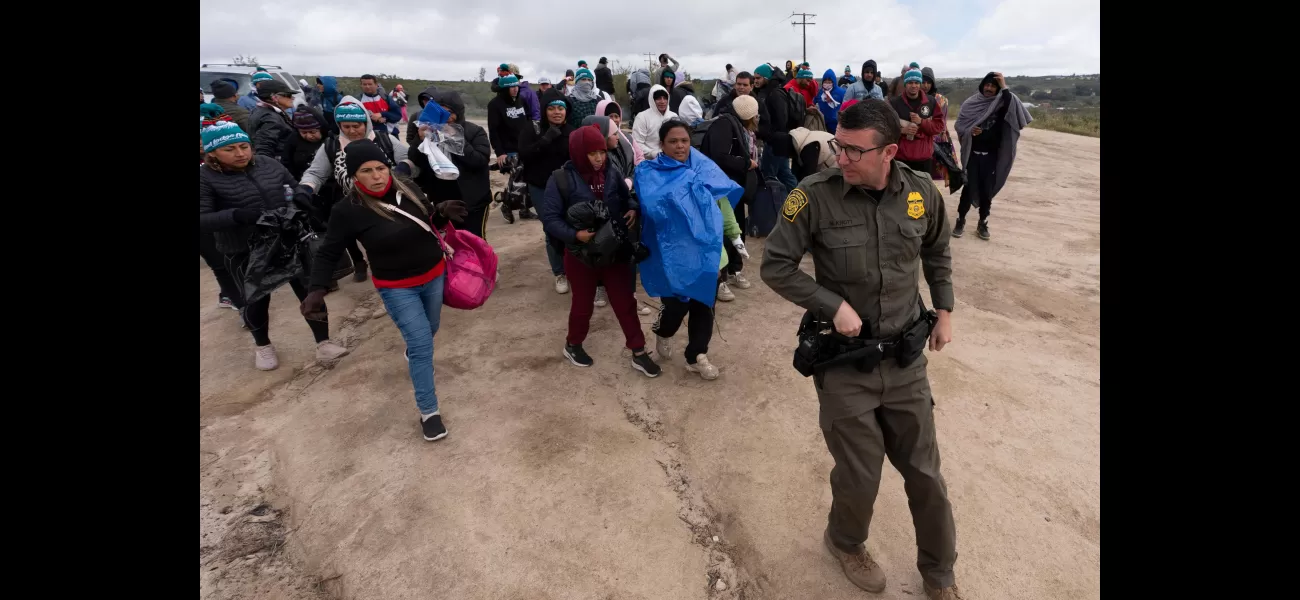Biden's order on asylum at the US border aims to stop the process.
Biden halts asylum at Mexico border when illegal entries are too high.
June 4th 2024.

On Tuesday, President Joe Biden made a significant policy shift by ordering a halt to asylum processing at the U.S.-Mexico border when the number of illegal entries reaches a certain threshold. This new measure, which takes effect immediately, was triggered by the current average of 4,000 daily entries, which is considered excessive. The timing of this decision, in the midst of an election year, has sparked criticism from Republicans who have been vocal about the unprecedented surge in new arrivals.
While advocates argue that this measure puts migrants in harm's way and goes against international obligations to provide safe haven to those in danger, the Biden administration maintains that it is necessary. However, legal challenges are expected to arise. There are also concerns about the effectiveness of this policy in deterring large-scale migrant entries. While Mexico has agreed to take back non-Mexican migrants, their willingness is limited and the U.S. lacks the necessary resources and diplomatic support to deport migrants to countries such as China and those in Africa.
Currently, many asylum seekers are allowed to live and work in the United States while their claims are being processed, a process that can take a substantial amount of time due to overwhelmed immigration courts. President Biden's proclamation raises some important questions:
- How will this play out in reality?
- What role does Mexico play?
- Has this been tried before?
The threshold set by Biden's order triggers a halt on asylum until the average daily arrests for illegal crossings falls below 1,500 for a week. The last time this happened was in July 2020, during the peak of the COVID-19 pandemic. Unlike the previous pandemic-related asylum restrictions, which had no legal consequences, this new measure will result in deportation orders for those who are denied the chance to seek asylum. This means that those who attempt to cross the border again will face criminal prosecution and be banned from legally entering the country for several years.
Under this new policy, migrants who express fear of being deported will be screened by U.S. asylum officers, but under stricter criteria than before. If they pass, they may be granted other forms of humanitarian protection, such as those outlined in the U.N. Convention Against Torture. However, unaccompanied children are exempt from this policy, which raises concerns that some parents may send their children across the border alone.
Mexico plays a critical role in this situation. The U.S. lacks the resources and diplomatic influence to deport large numbers of migrants to countries like China, Russia, and Venezuela. Additionally, a 1997 court order limits the detention of families with children under 18 for more than 20 days, making it challenging to screen and deport those expressing fear of deportation within a reasonable time frame. Mexico has agreed to take back up to 30,000 migrants per month from certain countries, but this agreement does not extend to other nationalities. In recent months, Mexico has also put measures in place to prevent migrants from reaching the U.S. border, such as stopping them on buses and preventing them from riding freight trains. However, this has resulted in many migrants being stranded in Mexican cities far from the border.
This is not the first attempt by the Biden or Trump administrations to deter asylum-seekers, but previous measures have not had a lasting impact. In May 2020, Biden imposed similar restrictions for those who crossed the border illegally after passing through another country, like Mexico. While these restrictions were allowed to remain in place while being challenged in court, they have had little effect. Although there was a brief decrease in illegal crossings, the limited number of screening officers proved to be insufficient for the high number of migrants. This highlights the disconnect between intentions and available resources. Biden's decision to invoke a section of the Immigration and Nationality Act, which allows the President to ban entry for groups of people if their presence is considered detrimental to the interests of the United States, has drawn comparisons to former President Donald Trump's travel ban on predominantly Muslim countries. However, advocacy groups are expected to argue that Biden has not met the criteria of this provision.
While advocates argue that this measure puts migrants in harm's way and goes against international obligations to provide safe haven to those in danger, the Biden administration maintains that it is necessary. However, legal challenges are expected to arise. There are also concerns about the effectiveness of this policy in deterring large-scale migrant entries. While Mexico has agreed to take back non-Mexican migrants, their willingness is limited and the U.S. lacks the necessary resources and diplomatic support to deport migrants to countries such as China and those in Africa.
Currently, many asylum seekers are allowed to live and work in the United States while their claims are being processed, a process that can take a substantial amount of time due to overwhelmed immigration courts. President Biden's proclamation raises some important questions:
- How will this play out in reality?
- What role does Mexico play?
- Has this been tried before?
The threshold set by Biden's order triggers a halt on asylum until the average daily arrests for illegal crossings falls below 1,500 for a week. The last time this happened was in July 2020, during the peak of the COVID-19 pandemic. Unlike the previous pandemic-related asylum restrictions, which had no legal consequences, this new measure will result in deportation orders for those who are denied the chance to seek asylum. This means that those who attempt to cross the border again will face criminal prosecution and be banned from legally entering the country for several years.
Under this new policy, migrants who express fear of being deported will be screened by U.S. asylum officers, but under stricter criteria than before. If they pass, they may be granted other forms of humanitarian protection, such as those outlined in the U.N. Convention Against Torture. However, unaccompanied children are exempt from this policy, which raises concerns that some parents may send their children across the border alone.
Mexico plays a critical role in this situation. The U.S. lacks the resources and diplomatic influence to deport large numbers of migrants to countries like China, Russia, and Venezuela. Additionally, a 1997 court order limits the detention of families with children under 18 for more than 20 days, making it challenging to screen and deport those expressing fear of deportation within a reasonable time frame. Mexico has agreed to take back up to 30,000 migrants per month from certain countries, but this agreement does not extend to other nationalities. In recent months, Mexico has also put measures in place to prevent migrants from reaching the U.S. border, such as stopping them on buses and preventing them from riding freight trains. However, this has resulted in many migrants being stranded in Mexican cities far from the border.
This is not the first attempt by the Biden or Trump administrations to deter asylum-seekers, but previous measures have not had a lasting impact. In May 2020, Biden imposed similar restrictions for those who crossed the border illegally after passing through another country, like Mexico. While these restrictions were allowed to remain in place while being challenged in court, they have had little effect. Although there was a brief decrease in illegal crossings, the limited number of screening officers proved to be insufficient for the high number of migrants. This highlights the disconnect between intentions and available resources. Biden's decision to invoke a section of the Immigration and Nationality Act, which allows the President to ban entry for groups of people if their presence is considered detrimental to the interests of the United States, has drawn comparisons to former President Donald Trump's travel ban on predominantly Muslim countries. However, advocacy groups are expected to argue that Biden has not met the criteria of this provision.
[This article has been trending online recently and has been generated with AI. Your feed is customized.]
[Generative AI is experimental.]
0
0
Submit Comment





